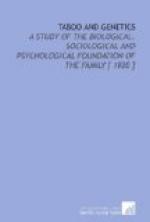Modern psychology has given us an explanation of the difficulty of eradicating the worship of such a goddess as the Great Mother of Asia Minor from the religion of even martial peoples who fear the contamination of woman’s weakness; or from a religion obsessed with hatred of woman as unclean by men who made the suppression of bodily passions the central notion of sanctity. The most persistent human relationship, the one charged with a constant emotional value, is not that of sex, which takes manifold forms, but that of the mother and child. It is to the mother that the child looks for food, love, and protection. It is to the child that the mother often turns from the mate, either because of the predominance of mother love over sex or in consolation for the loss of the love of the male. We have only recently learned to evaluate the infantile patterns engraved in the neural tissue during the years of childhood when the mother is the central figure of the child’s life. Whatever disillusionments may come about other women later in life, the mother ideal thus established remains a constant part of man’s unconscious motivations. It is perhaps possible that this infantile picture of a being all-wise, all-tender, all-sacrificing, has within it enough emotional force to create the demand for a mother-goddess in any religion.
To arrive at the concept of the Madonna, a far-reaching process of synthesis and reinterpretation must have been carried out before the Bible could be brought into harmony with the demands made by a cult of a mother goddess. Just as the views brought into the church by celibate ideals spread among heathen people, so the church must have been in its turn influenced by the heathen way of looking at things.[17] One of the great difficulties was the reconciliation of the biological process of procreation with divinity. But there had for ages been among primitive peoples the belief that impregnation was caused by spirit possession or by sorcery. This explanation had survived in a but slightly altered form in the ancient mythologies, all of which contained traditions of heroes and demi-gods who were born supernaturally of a divine father and a human mother. In the myths of Buddha, Zoroaster, Pythagoras and Plato, it was intimated that the father had been a god or spirit, and that the mother had been, and moreover remained after the birth, an earthly virgin. These old and precious notions of the supernatural origin of great men were not willingly renounced by those who accepted the new religion; nor was it necessary to make such a sacrifice, because men thought that they could recognize in the Jewish traditions something corresponding to the heathen legends.[18]




